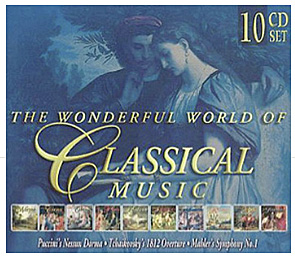
- Classical Music, Random Notes
The Wonderful World of Classical Music (10 CD Set)
Editor’s Note: In quiet moments, “lose your mind and find your soul” in the pleasures of classical music, an intrinsic part of our Western culture and civilization. Listen to Beethoven and Mozart. Some of us can do this while we read and work. My friend, the political science scholar, George Leef, Director of Research at the James G. Martin Center for Academic Renewal, a Renaissance man, and a lover of classical music has also agreed to announce classical music pieces for an all-classical internet station. I hope some of you will join him at his station on the internet at theclassicalstation.org from 3 to 6 p.m. on Sundays and from 1 to 4 p.m. on Mondays, Wednesdays, and Fridays.
This is the perfect introductory CD set to classical music. The ten CDs are entitled: Great Choral Classics, Great Piano Classics, Great Symphony Classics, Great Brass Classics, Great Opera Classics, Great Nature Classics, Great French Classics, Great Russian Classics, Great American Classics, and Great English Classics.
This collection is highly recommended as a Music Appreciation Course for the uninitiated as well as the connoisseur!

My favorites among this outstanding collection include:
1. Carl Orff (1895-1982), German composer and educator. Selection: Carmina Burana O Fortuna (1937), secular oratorio derived from Medieval German and Latin poem (Great Choral Classics). This beautiful Neoclassical composition was use in various acts of the film, Excalibur (1981) by John Boorman; starring Nigel Terry, Cherie Lunghi, Helen Mirren, Nicol Williamson, Clive Swift, and many other stars.
2. Giovanni Pergolesi (1710-1736), Italian composer. Selection: Stabat Mater Dolorosa (Great Choral Classics).
3. Giuseppe Verdi (1831-1901), foremost Italian operatic composer. Selections: Requiem Mass (Great Choral Classics); Rigoletto (1851), La Traviata (1853) and Aida (1871) all in (Great Opera Classics).
4. Anton Bruckner (1824-1896), Austrian composer, organist. Selection: Sanctus Te Deum Ave Maria (Great Choral Classics).
5. Richard Wagner (1813-1883), German Romantic composer, master of theatrical compositions, operas, etc. “Music dramas,” as his later works became known as, included the development of lietmotif — a brief passage of music used to characterize an episode or person. Librettos were written by him from German mythology. Culminated with German Romantic operas. Selections: Lohengrin: Bridal Chorus (Great Choral classics); The Flying Dutchman: Overture (Great Nature Classics); Gotterdammerung: Siegfried’s Rhine Journey (Great Brass Classics).
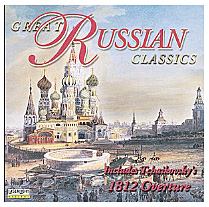
6. Modest Mussorgsky (1839-1891), Russian composer and member of “The Five”; national Russian style, folk songs and operas. Selections: Boris Godunov (1874; Great Choral Classics), Pictures at an Exhibition (1874; Great Brass Classics), Night on Bald Mountain (1860-66; Great Nature Classics), Dance of the Persian Slaves (1874; Great Russian Classics).
Note: “The Five” were a circle of 19th century Russian composers who met in Saint Petersburg, Russia between 1856-1870. “The Five” included Modest Mussorgsky and Nikolai Rimsky-Korsakov (whose works are included in this collection) as well as Mily Balakirev, Cesar Cui, and Alexander Borodin (whose works are not included in this collection).
7. Sergei Rachmaninov (1873-1943), Russian composer and pianist. Selections: Vocalise op 34 No 14 (Great Russian Classics); Bogoroditse Devo (Great Choral Classics).
8. Nikolai Rimsky-Korsakov (1844-1908), Russian composer and member of “The Five”; master of orchestration; his student was Igor Stravinsky. Selections: Scheherazade: The Sea and Sinbad’s Ship (1888; Great Nature Classics); The Flight of the Bumble Bee (Great Nature Classics); Tales of Tsar Saltan (Great Russian Classics); Capriccio Espagnol (Great Brass Classics).
9. Aram Khachaturian (1903-1978), Armenian composer and considered a “national treasure.” Selection: Sabre Dance (Great Russian Classics).
10. Peter Tchaikovsky (1840-1893), Russian composer, educated at the nascent Saint Petersburg Conservatory. Annual subsidy from a wealthy patroness, Nadezhda von Meck, allowed him to devote himself to music. Selections: 1812 Oventure (Great Russian Classics); Swan Lake: Dance Neapolitaine (Great Brass Classics).
11. Wolfgang Amadeus Mozart (1756-1791), Austrian composer, prodigy. Played for King Louis XV of France and Empress Maria Theresa as a child prodigy. Played the violin, harsichord, and organ and composed in all genres. Moved to Vienna and there befriended Joseph Haydn. Succeeded Gluck as court composer for Emperor Joseph II in 1787. Worked feverishly on a Requiem for a nobleman, which proved to be his own! Died at age 35 still in poverty and was buried in a common grave. Selections: Don Giovanni (Great Opera Classics); The Magic Flute (1791; Great Opera Classics); Requiem Mass: Lux Aeterna – Cum Sanctus Tuis (Great Choral Classics).
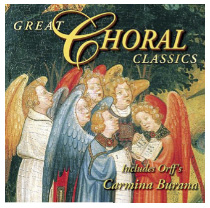
12. Georg Fredrich Handel (1685-1759), German-born, British composer, celebrated for his oratorios, Master of Baroque. Selection: Messiah: For Unto Us a Child is Born (Great Choral Classics).
13. Joseph Haydn (1732-1809), Austrian composer, Classical period, a friend of Mozart’s and a teacher of Beethoven. Selections: The Creation (Great Choral Classics); Symphony No. 89 Surprise: Menuet (Great Symphony Classics).
14. Johann Sebastian Bach (1685-1750), German composer and organist of Baroque period. Selection: Mass in B Minor: Sanctus (Great Choral Classics).
15. Giocomo Puccini (1858-1924), Italian composer and operalist of the late-Romantic period. Often called “the greatest composer of Italian opera after Verdi.” Selections: Madame Butterfly: Humming Chorus (Great Choral Classics); O Mio Babbino Caro (Great Opera Classics).
16. Ludwig van Beethoven (1770-1827), German composer and pianist, begins Romantic era in music, acknowledged Mozart and Haydn. Selections: Symphony No. 9 Choral (Great Choral Classics); Symphony No. 5 Pastoral (Great Symphony Classics); Piano Sonata No. 8 in C minor Pathetique (Great Piano Classics); Fur Elise (Great Piano Classics). Fur Elise (Great Piano Classics), a beautiful sonata easily recognizable in popular adaptations.
17. Franz Schubert (1797-1828), Austrian composer of early Romantic period. Selections: Piano Sonata in B-flat major, D 960: Andante sostenuto (Great Piano Classics); Symphony No. 9 in C major The Great: Finale. Allegro vivace (Great Symphony Classics). The Piano Sonata in B major was used very effectively in the dramatic horror film, The Hunger (1981) starring David Bowie, Catherine Deneuve, Susan Sarandon, and Cliff De Young.
18. Frederic Chopin (1810-1849), Franco-Polish composer and pianist of the Romantic era. Settled in Paris, had a liaison with writer George Sand. Selection: Piano Sonata No. 2 in B minor Funeral March (Great Piano Classics).
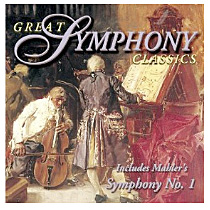
19. Gustav Mahler (1860-1911), Austrian composer and conductor. Viennese symphonic tradition. Selection: Symphony No. 1 in D major (Great Symphony Classics).
20. Felix Mendelssohn (1809-1847), German composer of the Romantic era, was a child prodigy. Selection: A Midsummer Night’s Dream (Great Brass Classics).
21. Franz von Suppé (1819-1895), Austrian composer of the Romantic period. Selection: Light Cavalry: Overture (Great Brass Classics).
22. Georges Bizet (1838-1875), French operatic composer of the Romantic era. Selections: Carmen: Overture (Great Opera Classics); The Pearl Fishers (Great Opera Classics).
23. Gioacchino Rossini (1792-1868), Italian composer of operas, including the Italian comedies “Opera buffa.” His comic masterpiece, The Barber of Seville (1816). Selection: The Barber of Seville (Great Opera Classics).
24. Alfredo Catalani (1854-1893), Italian operatic composer. He is best known for his opera La Wally (1892), based on Germanic folklore or legend about a girl named Wally who steals a vulture’s egg, but later throws herself into an avalanche. The opera is rarely performed due to the difficulty of staging the death scene. Wilhelmenia Fernandez, the American soprano, more recently popularized the Aria from La Wally when she performed it in the 1981 cult movie Diva. Selection: La Wally: Aria, Act I (Great Opera Classics).
25. Giacomo Meyerbeer (1791-1864), German operatic composer of spectacular grand operas. Selection: Coronation March (Great Opera Classics).
26. Richard Strauss (1864-1949), German composer/conductor (not to be confused with the line of Viennese musicians), who composed dramatic operas influenced by Wagner’s leitmotif concept. His work, Thus Spoke Zarathustra, has been consistently performed since its first performance in 1896. The opening fanfare, named “Sunrise” in the composer’s notes, became well-known after its use in Stanley Kubrick’s 1968 movie 2001: A Space Odyssey. Selection: Also Sprach Zarathustra (Great Nature Classics).
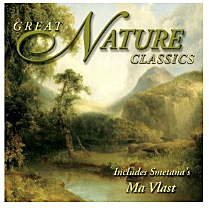
27. Igor Stravinsky (1882-1971), Russian-American composer, considered an important and one of the most influential composers of the 20th century. He was a student of Nikolai Rimsky-Korsakov. Selection: The Rite of Spring (Great Nature Classics).
28. Bedrich Smetana (1824-1884), Czech composer. Often called the founding father of Czech music. Selection: Má vlast. Vltava (Great Nature Classics).
29. Claude Debussy (1862-1919), French composer associated with musical impressionism. Selection: La Mer (Great French Classics).
30. Hector Berlioz (1803-1869), French composer who left medical school for music. Selection: La Damnation de Faust (1846; Great French Classics).
31. Jacques Offenbach (1819-1880), German-born French composer. Selections: Orpheus in the Underworld: Overture (Great French Classics); Tales of Hoffmann: Barcarolle (Great French Classics).
32. Camille Saint-Saens (1835-1921), French composer. Selection: Dance Macabre (Great French Classics).
33. George Gershwin (1898-1937), American composer. Selections: Variations on “I Got Rhythm” (Great American Classics); Rhapsody in Blue (Great American Classics).
34. Leonard Bernstein (1918-1990), American composer/conductor. Selections: Candide: Overture (Great American Classics); West Side Story: Medley (Great American Classics).
35. Edward Elgar (1857-1934), English composer. Selection: Pomp and Circumstance March No. 1 (Great English Classics).
36. Ralph Vaughn Williams (1872-1958), English composer. Selection: Greensleeves (Great English Classics).
Written by Dr. Miguel Faria
Miguel A. Faria Jr. M.D. is a neurosurgeon and the author of the book, Cuba in Revolution: Escape from a Lost Paradise (2002), author of many articles on science, politics, medicine, and classical history.
Copyright ©2015 Miguel A. Faria, Jr., M.D.